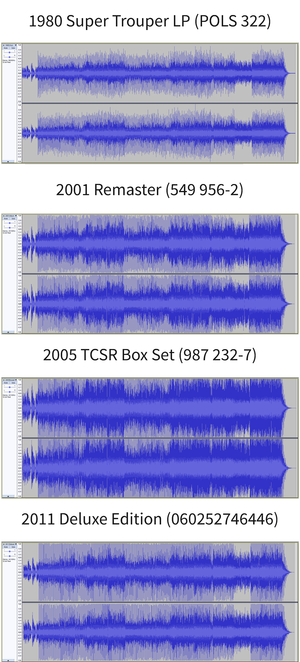
Back Guerra del volum Catalan Loudness war Czech Loudness War German Guerra del volumen Spanish جنگ بلندی صدا Persian Volyymisota Finnish Guerre du volume French מלחמת הרעש HE Hangerőháború Hungarian Perang kenyaringan ID

The loudness war (or loudness race) is a trend of increasing audio levels in recorded music, which reduces audio fidelity and—according to many critics—listener enjoyment. Increasing loudness was first reported as early as the 1940s, with respect to mastering practices for 7-inch singles.[1] The maximum peak level of analog recordings such as these is limited by varying specifications of electronic equipment along the chain from source to listener, including vinyl and Compact Cassette players. The issue garnered renewed attention starting in the 1990s with the introduction of digital signal processing capable of producing further loudness increases.
With the advent of the compact disc (CD), music is encoded to a digital format with a clearly defined maximum peak amplitude. Once the maximum amplitude of a CD is reached, loudness can be increased still further through signal processing techniques such as dynamic range compression and equalization. Engineers can apply an increasingly high ratio of compression to a recording until it more frequently peaks at the maximum amplitude. In extreme cases, efforts to increase loudness can result in clipping and other audible distortion.[2] Modern recordings that use extreme dynamic range compression and other measures to increase loudness therefore can sacrifice sound quality to loudness. The competitive escalation of loudness has led music fans and members of the musical press to refer to the affected albums as "victims of the loudness war".
- ^ Cite error: The named reference
npr2009was invoked but never defined (see the help page). - ^ Milner, Greg (7 February 2019). "They Really Don't Make Music Like They Used To". The New York Times.